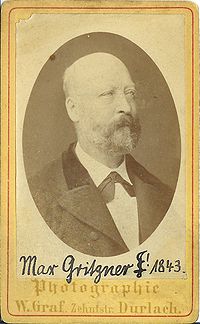Max Carl Gritzner
Max Carl Gritzner (born April 12, 1825 in Vienna ; † September 10, 1892 in Durlach ) was a German industrialist and inventor .
Life
After Gritzner had attended three annual courses at the polytechnic school in Vienna, he came to Karlsruhe in autumn 1843 . Until 1846 he attended the Polytechnic , where he was registered in the classes for mathematics and mechanical engineering . The contact to Karlsruhe probably came about through Gritzner's cousin, Ferdinand Redtenbacher , who was a professor in Karlsruhe. During his studies in 1843 he was one of the founders of the Karlsruhe fraternity of Teutonia .
Gritzner emigrated to America via Liverpool on May 11, 1850 . He gave up Austrian citizenship and became an American. Presumably Gritzner got to know the manufacture of sewing machines at the Singer factory in America . After his return he founded the Gritzner works with his father Maximilian Joseph Gritzner in Durlach in 1872 . He invented the double rotating gripper without glasses and equipped his machines with a bobbin case lifter, a rotating thread dispenser and a controlled thread tension. However, his idea only became popular much later when it was adopted by American sewing machine manufacturers.
Gritzner was married to Pauline (née Marx) and the couple had two sons.
Honors
In 1912 the Gritznerstrasse in Karlsruhe-Durlach was named after him.
Works (selection)
- Refugee life: With an introductory chapter by Moritz Hartmann , 1867. (Online)
literature
- Helge Dvorak: Biographical Lexicon of the German Burschenschaft. Volume I: Politicians. Sub-Volume 2: F-H. Winter, Heidelberg 1999, ISBN 3-8253-0809-X , p. 181.
- Susanne Asche, Konstanze Ertel, Anke Mührenberg: Factory in the museum. Industry and commerce in Durlach. (= Publications of the Karlsruhe City Archives , Volume 27.) Karlsruhe 2003, ISBN 3-88190-328-3 , p. 78 f. ( Preview on google books )
Web links
| personal data | |
|---|---|
| SURNAME | Gritzner, Max Carl |
| BRIEF DESCRIPTION | German inventor and industrialist |
| DATE OF BIRTH | April 12, 1825 |
| PLACE OF BIRTH | Vienna |
| DATE OF DEATH | September 10, 1892 |
| Place of death | Durlach |
